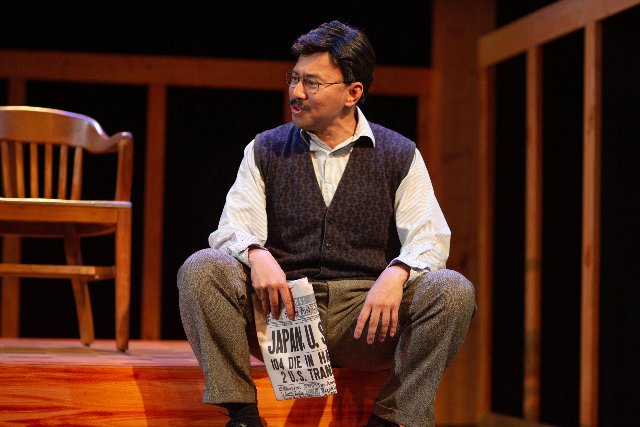Hold These Truths by Jeanne Sakata
Produced by San Francisco Playhouse
By: Victor Cordell - Jun 10, 2021
Gordon Hirabayashi grew up in Washington state as a nisei, a second-generation Japanese-American. Although imbued with reverence for the United States Constitution, his “aha” moment comes upon his initial case before the United States Supreme Court, realizing then the painful contradiction between the Constitution as a most laudable political contract and those who were appointed to uphold it.
Playwright Jeanne Takata’s one-man, biographical drama “Hold These Truths” beautifully captures Hirabayashi’s courage and sacrifice in challenging President Franklin D. Roosevelt’s 1942 Executive Order 9066, which consigned Japanese-Americans, including those who were American citizens, to internment camps during World War II. This act displaced human beings based strictly upon race, forcing them to virtually give away businesses, property, and personal possessions.
Unlike any other nation, American polity is anchored in the bedrock of a set of glorious documents that provides a guiding light for democracy. At conception, its Declaration of Independence embraced the radical notion that “We hold these truths to be self-evident, that all men are created equal.” And at its birthing, the Preamble to the U.S. Constitution observes that the first objective of the American people is “to form a more perfect union,” conceding the new nation’s flaws at outset, but implying the quest of better welfare for its posterity.
American democracy has largely improved with age but not without suffering setbacks. Egregious and systemic racism is at the core of many of our failures to live up to the grandiloquence of our ideals – slavery as an accepted practice at our inception; breaching of innumerable treaties and other agreements with Native American tribes; Jim Crow laws in the South to deny African-Americans their rights following the emancipation amendments; the Chinese Exclusion Act of 1882 suspending Chinese immigration; the rejection of Jewish refugees during World War II and in the face of the Holocaust; and the blatantly discriminatory voter suppression laws passed or currently proposed by Republicans in over 25 states that are designed to impair blacks’ and other minorities’ ability to exercise their most cherished democratic rights. All of these horrific practices fomented by our elected leaders serve to generalize the specifics of this play concerning the Japanese Relocation Order.
“Hold These Truths” is a love letter from the playwright to Hirabayashi’s memory. Seemingly an average kind of guy who is a little diffident and socially clumsy, Takata largely applies a light touch to his childhood and time as a student at the University of Washington. Although Hirabayashi adheres to the cautions of Japanese geography in Seattle, meaning he knows to avoid walking certain blocks because of anti-Japanese signs and in which shops and cafes he won’t receive service, he lives like a typical poor student.
Inflamed by the wartime actions against Japanese-Americans by the government, but lacking any expertise or strategy, he rises to the occasion and defies the order, certain that he is protected by the Constitution. Some droll incidents occur after he is found guilty. For reasons that won’t be shared, he asks for a longer sentence than he is originally given, but is told that the court doesn’t have the funds to transport him to an appropriate facility. So, he negotiates to wend his way to prison on his own recognizance! 1,500 miles away! In Tucson, Arizona!
The pace of “Hold These Truths” is a bit pedestrian, yet it excels in storytelling. Surprisingly, a relatively small portion of it is dedicated to the reason that we care about Gordon Hirabayashi – the Supreme Court cases that challenged the unequal treatment of Japanese-Americans in World War II on the basis of race. Yet, the character is very involving, and the storyline holds the audience’s attention.
A key element that makes the play work is the astounding tour-de-force performance of Jomar Tagatac, who conveys such genuineness and believability in the main role. The actor has become recognized as one of the great performers in the Bay Area, but he has been seen in plays with ensembles in which he constitutes part of a whole. Now he has proven beyond a doubt that he can single-handedly carry a one-hour-and-forty-five minute production with great conviction.
As Hirabayashi, Tagatac displays a wide range of emotions with engaging animation. With Jeffrey Lo’s direction, his movement around the spare set and changes in affect keep the action lively. In addition to playing the central character, he voices and mimes many others, from his mother and father to prisoners and judges. His voicings are distinctive, yet never exaggerated. Significantly, he uses posture and micromovement with remarkably subtle precision to bring even brief characterizations into focus.
This review is of a first preview, and in normal times, one would not publish a review of a preview. Of course, these are not normal times. Because of pandemic capacity constraints, SF Playhouse must spread the reviewers across several nights and has requested this exception. This is the first indoor live performance that this theater lover has seen in 15 months. There were a few hiccups along the way, but who cares? I won’t even mention what they were. It is a highly recommended theatrical experience.
“Hold These Truths” is written by Jeanne Sakata, produced by San Francisco Playhouse, and plays on their stage at 450 Post Street, San Francisco, CA through July 10, 2021. It is also available streaming online throughout the run.
Victor Cordell, Ph.D.
American Theatre Critics Association
San Francisco Bay Area Theatre Critics Circle

